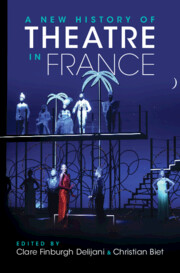Book contents
- A New History of Theatre in France
- A New History of Theatre in France
- Copyright page
- Dedication
- Contents
- Illustrations
- Contributors
- Acknowledgements
- Notes on the Text
- Introduction
- Chapter 1 The Performing Arts in Fifteenth- and Sixteenth-Century France
- Chapter 2 Drama during the Wars of Religion
- Chapter 3 Drama before Standardization
- Chapter 4 Neo-Classical Tragedy
- Chapter 5 Molière, a Man of the Stage?
- Chapter 6 Theatres as Economic Concerns
- Chapter 7 Seventeenth-Century Printed Theatre
- Chapter 8 Non-Official Eighteenth-Century Stages
- Chapter 9 The Expanded Theatre of the French Revolution
- Chapter 10 Nineteenth-Century Melodrama, Vaudeville and Entertainment
- Chapter 11 New Approaches to Women Actors and Celebrity in Nineteenth-Century France
- Chapter 12 Extended Romanticism in the Extended Nineteenth Century
- Chapter 13 Poetry in Action, 1945–1968
- Chapter 14 Performance and Installation Art
- Chapter 15 Twentieth- and Twenty-First-Century Theatre Directing
- Chapter 16 Political Theatre in France (1954–2020)
- Chapter 17 Liberating Third World Theatre
- Chapter 18 Francophone Theatre-Makers in France
- Chapter 19 Migration in Modern and Contemporary Playwriting
- Chapter 20 An Interview with Éric Ruf
- Chapter 21 An Interview with Magali Mougel
- Chapter 22 An Interview with Phia Ménard
- Bibliography
- Index
- References
Chapter 18 - Francophone Theatre-Makers in France
Traumatizing the French Stage
Published online by Cambridge University Press: 22 October 2024
- A New History of Theatre in France
- A New History of Theatre in France
- Copyright page
- Dedication
- Contents
- Illustrations
- Contributors
- Acknowledgements
- Notes on the Text
- Introduction
- Chapter 1 The Performing Arts in Fifteenth- and Sixteenth-Century France
- Chapter 2 Drama during the Wars of Religion
- Chapter 3 Drama before Standardization
- Chapter 4 Neo-Classical Tragedy
- Chapter 5 Molière, a Man of the Stage?
- Chapter 6 Theatres as Economic Concerns
- Chapter 7 Seventeenth-Century Printed Theatre
- Chapter 8 Non-Official Eighteenth-Century Stages
- Chapter 9 The Expanded Theatre of the French Revolution
- Chapter 10 Nineteenth-Century Melodrama, Vaudeville and Entertainment
- Chapter 11 New Approaches to Women Actors and Celebrity in Nineteenth-Century France
- Chapter 12 Extended Romanticism in the Extended Nineteenth Century
- Chapter 13 Poetry in Action, 1945–1968
- Chapter 14 Performance and Installation Art
- Chapter 15 Twentieth- and Twenty-First-Century Theatre Directing
- Chapter 16 Political Theatre in France (1954–2020)
- Chapter 17 Liberating Third World Theatre
- Chapter 18 Francophone Theatre-Makers in France
- Chapter 19 Migration in Modern and Contemporary Playwriting
- Chapter 20 An Interview with Éric Ruf
- Chapter 21 An Interview with Magali Mougel
- Chapter 22 An Interview with Phia Ménard
- Bibliography
- Index
- References
Summary
Examining five prominent Afro-descendant artists creating theatre in contemporary France, Miller first enquires about the ambiguous concept of francophonie by considering the potential for ghettoizing work when it is produced in venues destined exclusively for theatre from the French-speaking world outside France. A portrait of Black Francophone theatre emerges, in which Black playwrights capture the current malaise of people still defined by the dominant French gaze, the potency of which is only now beginning to diminish. Kossi Éfoui conjures parables where puppet-like characters cannot think themselves outside the confining walls built by others. Koffi Kwahulé places fragments of a personality ravished by a madman with Christ’s eyes, in dialogue with each other. Aristide Tarnagda confronts self-exiled beings with a plethora of reasons for their alienation. Gustave Akakpo takes Little Red Riding Hood on a voyage on which her consumerist parents want to sell her image. Marie NDiaye places offstage the nonetheless omnipresent forces that fuel the perverse and destructive energy of characters on stage. Experimentation with voicing and characterization, collage, absent presence and fractured fairy tale plunges audiences into a universe of constant danger, while gesturing to the possibility of liberation through leaps of empathy and imagination.
Keywords
- Type
- Chapter
- Information
- A New History of Theatre in France , pp. 347 - 365Publisher: Cambridge University PressPrint publication year: 2024

